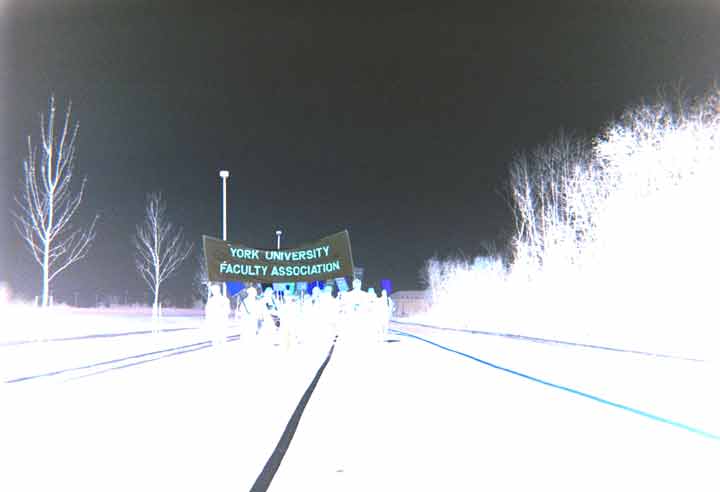 |
|
|
But I'm not just a dancer, happy to be back in classes and rehearsals. I'm not just a student suffering financial, emotional and mental stress due to the strike. I'm also a person in the world. If there's one thing the picketing members of CUPE 3903 called to my attention day after day, it's that the world is not somebody else's business. When I looked at the issues that gave rise to the strike I found myself sympathetic to the union cause. The central issues were job security for contract faculty and the tying of Graduate Assistant and Teaching Assistant wages to increases in their tuition, otherwise known as tuition indexation. Since graduate tuition has increased sixty percent in the last two years and wages have increased only two percent, accessibility of graduate education was hanging in the balance. It became obvious to me that what they were seeking was not unreasonable and that their struggle reflected the larger issue of diminished funding for all levels of education in Ontario. When I think about the effects of the strike, the first thing that comes to mind is the fact that it made a difference. These individuals who stood in solidarity against the monolithic organization that is York University proved that we are not helpless, that we can change the way the wealth flows. York TAs and GAs got tuition indexation and contract faculty got some measure of job security. The strong union at York was able to set a precedent for other universities across the country and has already had an impact in Ontario. Members of the CUPE union at Carleton University recently won tuition indexation in negotiations with that university's administration. The success of the strike at York is empowering. This makes it easier to put into perspective the financial and mental hardships it has put on many students. Since October 26th, the day the strike began, undergraduate students have been frustrated by our status as pawns. The picket lines put a barrier between myself and my education in dance. Every day I had to re-evaluate the impact of my actions. I had to decide how much I was willing to sacrifice to show support and what it means to cross picket lines. There were many ways to support the cause of the union and crossing picket lines did not an evil person make. Some university staff had to choose between failing to pay rent or crossing the line to go to work. There are many perspectives, and mine changed almost every day. Actions taken during the strike were personal and complicated. The fact remains that every day for seventy-seven days there were people in my community broadcasting a huge injustice and asking me to respond. Every day I was forced to examine the issues and question my values. Every day I had to challenge myself to not simply be a victim of this strike and now I challenge myself to not simply recover from it and go back to business as usual. We no longer have anyone in our faces asking us for support but our actions still have impact. This goes beyond the strike at York and into all areas of life. It's about becoming educated, it's about who one votes for, it's about where one buys ones clothes, it's about action and it's about choices. Because we are engaged in living we cannot keep our heads down and ignore those issues in our world that don't necessarily affect our own basic needs. I am reminded of 'On the Move,' a conference held for students completing their final year at post secondary dance institutions in Toronto. The event, hosted by Allen Kaeja and Rex Harrington, January 25th, sparked conversations about audience-artist connection, parallel careers, and funding for dance. These are issues that concern dancers and also extend into a larger community. The more we engage and embrace our voices the more awareness we can gain about that bigger picture. As students overwhelmed with the all-consuming effects of our studies it is easy to lose perspective and forget that we are a part of something so much larger. Our actions have impact and in the words of John Donne, 'No man is an island, entire of itself; every man is a piece of the Continent, a part of the main...'
This piece was first published in The Dance Current, March 2001
|
|